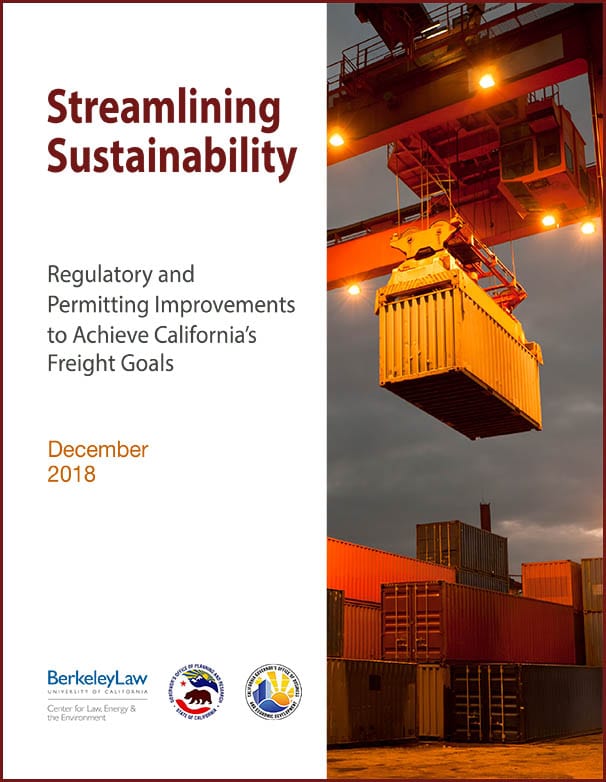 A new report released today from UC Berkeley School of Law, Streamlining Sustainability: Regulatory and Permitting Improvements to Achieve California’s Freight Goals, offers state and local policy reforms for California leaders to increase the sustainability and efficiency of the state’s freight system.
A new report released today from UC Berkeley School of Law, Streamlining Sustainability: Regulatory and Permitting Improvements to Achieve California’s Freight Goals, offers state and local policy reforms for California leaders to increase the sustainability and efficiency of the state’s freight system.
Freight is responsible for hundreds of thousands of jobs in California and feeds commerce and agriculture throughout the state and the entire nation. But the trains, trucks, aircraft, and ocean vessels that ship goods throughout California are responsible for a disproportionate amount of greenhouse gas emissions and harmful air pollutants (such as nitrogen oxides and sulfur dioxide), particularly in disadvantaged communities near railyards and ports. A range of strategies and technologies, from electrified heavy-duty trucks to increasing the use of rail at ports, can modernize the system and reduce emissions. But these projects can be challenging to implement in the current legal and policy ecosystem.
To reduce these impacts and maintain competitiveness, UC Berkeley Law’s Center for Law, Energy and the Environment (CLEE) partnered with the Governor’s Offices of Planning and Research (OPR) and Business and Economic Development (GO-BIZ) to offer recommendations to increase the rate that cleaner freight technologies are integrated into the system, while helping the state achieve the goals in 2016’s Sustainable Freight Action Plan.
Top recommendations include:
- Convening sustainable freight “red teams” to conduct holistic analysis and clear local and state-level permitting roadblocks for high-priority infrastructure projects;
- Facilitating “tiered” review under the California Environmental Quality Act to comprehensively assess impacts and benefits of related freight projects; and
- Increasing the use of community benefit agreements and project labor agreements to earn the support of local communities and labor groups most likely to be affected by new projects or technological developments.
The report is informed by a stakeholder convening held in the Governor’s Office, organized and moderated by UC Berkeley School of Law. It describes a range of other measures, from a messaging campaign to raise public awareness about the freight system to pilot programs that allow industry members to securely share key data, that could increase support for sustainable freight from the policy, industry, and community and environmental advocacy spheres.
The implications of a sustainable freight system are significant. Freight is directly involved in approximately one third of the California economy, including both exports and imports. For example, California is the largest supplier of food to the rest of the nation and the point of entry for the vast majority of goods imported from Asia. California’s freight system leaders will need to maximize its efficiency to retain this position of prominence while protecting California residents and workers. We hope these recommendations will help California achieve its ambitious emission reduction, public health, and economic competitiveness goals.
To download the new report, click here.


